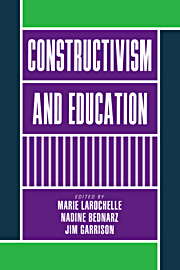Book contents
- Frontmatter
- Contents
- Preface
- List of contributors
- I Introduction
- II From epistemological constructivism to teaching: a variety of views
- III Teaching within the constructivist mode: practices and promises
- 5 Individual construction, mathematical acculturation, and the classroom community
- 6 The construction of answers to insoluble problems
- 7 Voice and perspective: hearing epistemological innovation in students' words
- 8 Constructivism-in-action: students examine their idea of science
- 9 Constructivism and ethical justification
- 10 Social studies, trivial constructivism, and the politics of social knowledge
- 11 Practical knowledge and school knowledge: a constructivist representation of education
- IV The mediating role of teachers and teacher education
- V Conclusion
- Notes
- References
- Index
6 - The construction of answers to insoluble problems
Published online by Cambridge University Press: 04 August 2010
- Frontmatter
- Contents
- Preface
- List of contributors
- I Introduction
- II From epistemological constructivism to teaching: a variety of views
- III Teaching within the constructivist mode: practices and promises
- 5 Individual construction, mathematical acculturation, and the classroom community
- 6 The construction of answers to insoluble problems
- 7 Voice and perspective: hearing epistemological innovation in students' words
- 8 Constructivism-in-action: students examine their idea of science
- 9 Constructivism and ethical justification
- 10 Social studies, trivial constructivism, and the politics of social knowledge
- 11 Practical knowledge and school knowledge: a constructivist representation of education
- IV The mediating role of teachers and teacher education
- V Conclusion
- Notes
- References
- Index
Summary
The cognitive answer as a construction
In order to show the relevance of using “insoluble problems” as a means of approaching the educational problematic of problem solving, we must first frame the constructivist approach which characterizes this research work. This theoretical contribution is to be located in the socioconstructivist current which advocates a ternary model according to which the relationship of an ego to the world and its objects is always mediated by a real or potential alter (Gilly, 1991). It is within this psychosocial current, which challenges the validity of a constructivist perspective conceived of within an “individualistic” framework, that we join with other authors (Perret-Clermont and Nicolet, 1988) in: (1) refusing to limit the debate to the classic oppositions between “innate/acquired, imitation/construction, the working out of answers hic et nunc/actualization of preexisting potentialities”; and (2) advocating “that cognitive answers acquire the status of construction” (Iannaccone and Perret-Clermont, 1990). By no means the easy way out, such a choice indeed entails approaching the problem of knowledge via the observable, ad hoc situations in which the answers of individuals manifest. The status of answers is at that point analyzed in accordance with the postulate that “while an answer is never totally new, it is articulated in the hic et nunc of the social situation with which the individual is confronted and is based both on the experience which he or she has acquired and the ‘cultural heredity’ which he or she has available to him or her” (ibid.).
Information
- Type
- Chapter
- Information
- Constructivism and Education , pp. 81 - 103Publisher: Cambridge University PressPrint publication year: 1998
Accessibility standard: Unknown
- 3
- Cited by
